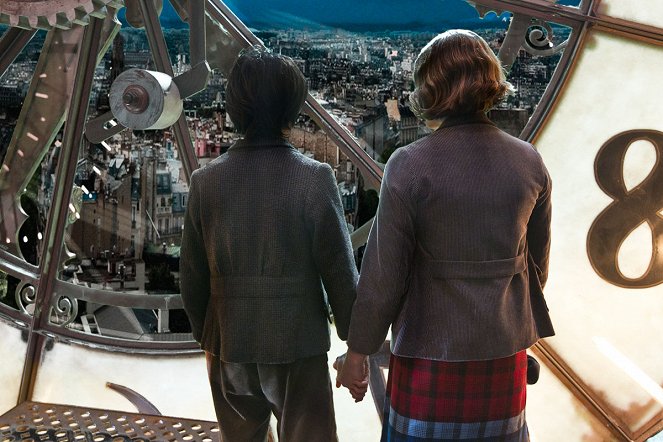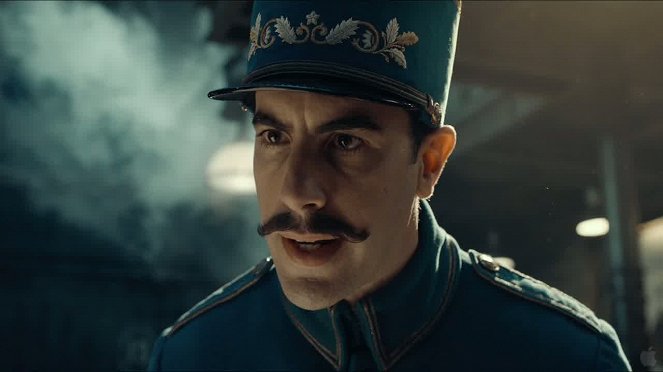Directed by:
Martin ScorseseScreenplay:
John LoganCinematography:
Robert RichardsonComposer:
Howard ShoreCast:
Asa Butterfield, Chloë Grace Moretz, Ben Kingsley, Sacha Baron Cohen, Helen McCrory, Jude Law, Gulliver McGrath, Christopher Lee, Frances de la Tour (more)VOD (2)
Plots(1)
Throughout his extraordinary career, Academy Award-wining director Martin Scorsese has brought his unique vision and dazzling gifts to life in a series of unforgettable films. This time the legendary storyteller invites you to join him on a thrilling journey to a magical world with his first-ever 3-D film, based on Brian Selznick's award-winning, imaginative New York Times best-seller, The Invention of Hugo Cabret. Hugo is the astonishing adventure of a wily and resourceful boy whose quest to unlock a secret left to him by his father will transform Hugo and all those around him, and reveal a safe and loving place he can call home. (official distributor synopsis)
(more)Videos (16)
Reviews (10)
2009 – Pandora. 2010 – the cyberspace of TRON Legacy 3D. 2011 – A Parisian train station. Three very different magical worlds and three reasons to pay a few crowns more of a 3D cinema ticket. In addition to the intoxicating visuals, Hugo captivates with its two child protagonists (such likeable kids is not something you see everyday in film – with Chloe is no surprise, but Asu was unknown to me) and its sincere love for cinema. As it’s clear from all the reviews, Hugo is a beautiful celebration of the beginnings of cinematography and it’s very easy to surrender to it. What’s worth noticing is that both Hugo and the silent and black and white The Artists are this year’s biggest Oscar favourites and they’ve received the most nominations. Both deal with a certain period that marked a turning point for cinema. Hugo focuses on the beginning of the century in France, and in particular the work of G. Mèliès, which was setting the trends at the time, and the turning point means WWI, due to which the epicentre of the film world moved to America. The Artist, in contrast, celebrates the American silent movies of the 20th century, and the turning point is sound. Both of them imprint the world into their format, where The Artist is a silent romantic comedy and Hugo is a fairytale that uses special effects to bring the viewer into its (3D) world (and that’s why you must watch it in 3D). Almost like Mèliès A Trip to the Moon, init? :). It’s interesting how it came together this year…
()
A movie about movies for people who like movies. Nothing earth-shattering in terms of story, but Marty reminds me of Méliès himself in terms of technical implementation and eye for detail. The same applies to the old captivating images hidden throughout the picture. Movies used to be a way of creating dreams, while today the audience wants to see reality. And isn’t there enough room for both?
()
Paradox: the simplest film illusion created in the most technically complex way. A return to the initial astonishment. For me, it’s not closest to The Artist and other parallels presented here, but rather Herzog's Cave of Forgotten Dreams. Even Scorsese tries to return to the magical moment of ecstasy from the world of visions, to the dimension in which the image on the retina changes into the complex world behind it. I spent two hours in the movie theatre in bliss and ecstasy from something that was not and is not. Hugo's value is not in its (factually dubious) encyclopedic teachings, but in the fact that the film teaches us to rejoice in the imagination - not in the stimulating visual expansion that evokes its utter stunting, but in the journey into the interior in which the most beautiful spells are always performed, stimulated by the magic of pen and celluloid masters. I hope that one day I will raise a kid that the anachronistic illusionist Hugo will entertain, even with its embarrassingly romantic (and soothing) vision of the world as a mechanism in which everything has a fixed place...
()
He got me! I am usually coldly dismissive toward attempts to move me with a pitiful orphan or a feeble old man and often openly mock them, but here my eyes were teary and I was genuinely touched. That makes it even more disappointing to state that it is probably a suicidal film that will be a big flop at the box office and could only be partially saved by a few Oscars and the associated publicity. Because, contrary to the claims of many, it is not a typical family film, but rather an arthouse film that is suitable for projection at festivals and in film clubs. While Cameron used 3D technology to shoot a spectacular fairy tale, Scorsese used it to create a nostalgic tribute, not only to cinema, but to art in general, be it visual or literary, and to his enthusiastic admirers. It is also a homage to the technique and science that fulfills the legacy of the classic and the founder of the sci-fi genre, Jules Verne, who died a quarter century before Scorsese's story takes place, but still, it seems as if the script and characters came from his pen. Actually, it seems to me that after Zeman's film Invention for Destruction, this film is the best portrayal of Verne's world of values. All the amazing gears, complex machines, smoking locomotives and inventions, and the whole ingeniously constructed atmosphere are exactly what fits into Verne's works. Thanks to a generous budget and the enthusiasm of the actors involved, as well as Scorsese's long-standing directorial experience, an outstanding film was created that, in my opinion, will be remembered in film history. While watching it, you will recall several specific scenes from famous films of the past, without Hugo cheaply plagiarizing them. Ben Kingsley will not be associated with the character of Gandhi for me, as he is with others, but rather with the character of Méliès, and Chloë Grace Moretz gave an incredible performance for her age. Her character is charming, and that girl simply has charisma. Overall impression: 100%.
()
Some dreams do come true. The magic of film intertwines with reality, sketches with meticulously crafted images fly through the air, and Martin Scorsese pays homage to the beginnings of cinematography without getting overly sentimental or desperately trying to become a classic. Hugo seems to be a sophisticated fairy tale about a boy and his great adventure, only to ultimately transform into a fascinating journey through human imagination and determination. And that nostalgic hurricane of memories of children's books and movies, as well as fascination with unreachable worlds, managed to fully captivate me with its strength.
()
Gallery (114)
Photo © Paramount Pictures



Ads